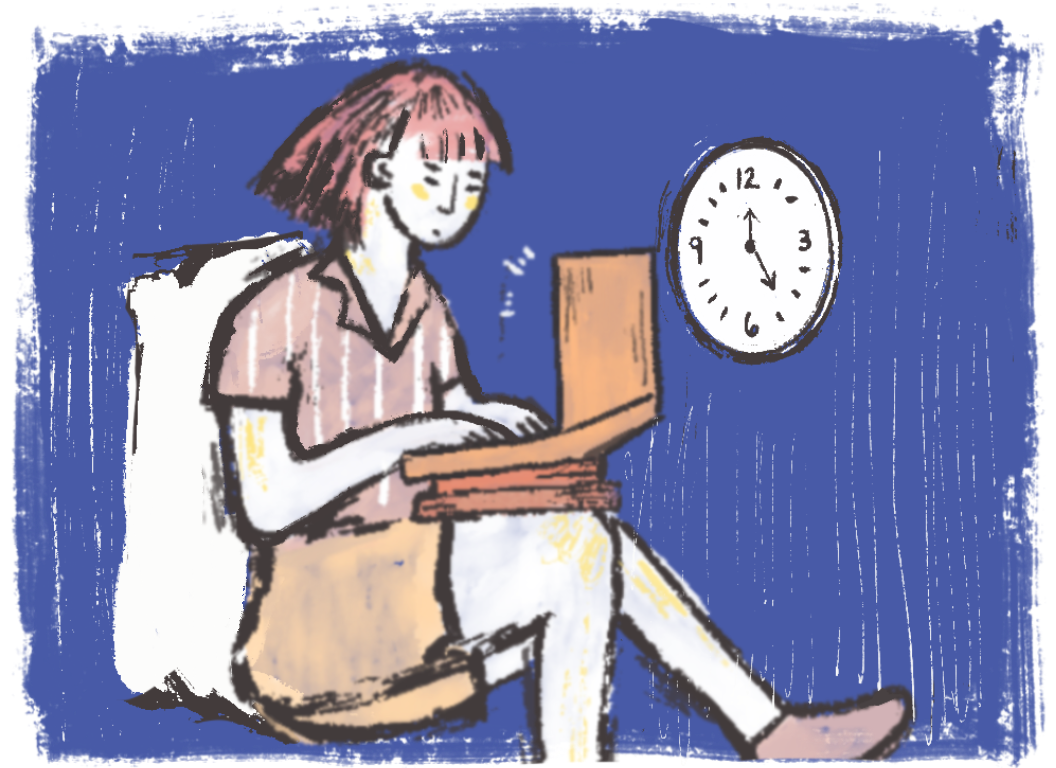Students, professors adjust to different time zones with online instruction

(Lily Lee/Daily Bruin)

By Megan McCallister
April 6, 2020 9:41 p.m.
Most UCLA students have settled in at home to take spring quarter online. But for Anay Mehta, that means taking a computer science midterm at 5 a.m.
Mehta, a first-year mechanical engineering student, lives in Dubai. All of his classes occur between 7 p.m. and 5 a.m. GST, which is 11 hours ahead of PST. Mehta plans to attend three of his four classes in real time, with the exception of a 3 a.m. computer science lecture, to avoid falling behind.
“It just wouldn’t be healthy to stay up for that class,” Mehta said. “There’s just no way. I would completely screw my mental health.”
On March 13, UCLA moved all classes online for spring quarter. It also encouraged UCLA students to go home; by March 24, 80% of the students living on the Hill had moved out.
However, in the 2018-2019 school year, 12% of undergraduate students and 26% of graduate students at UCLA are international students and those that returned home face a new problem: time zones.
Many professors across departments have opted to record lectures to let international students attend class at better times. However, some have not.
Jin Lee, a second-year geography/environmental studies student, had to drop a class that only held live Zoom lectures in the middle of the night on Malaysia Time.
Since the lecture slides posted on CCLE only contained outlines of information, Lee would have had to catch up by purchasing and reading a $120 textbook.
Some professors, especially those teaching performance-based classes, face higher barriers to making their classes accessible to students of all time zones.
Communication 1: “Principles of Oral Communication” requires students give four speeches to their classmates over the course of the quarter. Lecturer Karen Mack has committed to accommodating students who cannot give speeches over Zoom by allowing submission of videos in place of live presentations.
However, those who opt out of live presentations lose the benefit of immediate peer and instructor feedback, she said. Although Mack has a number of students taking her course from the eastern hemisphere, each of these students has expressed their willingness to attend class and present speeches in real time.
“We’re going to try and retain as much of the original spirit and feeling of the course as possible with the understanding that it may be difficult this quarter,” Mack said.
Tiara Thompson, a teaching assistant for Theater 20: “Acting Fundamentals,” another performance-based class, does not plan to record her classes. The group environment is integral, she said.
The course, which is typically collaborative, has had to be restructured to incorporate more individual work as a result of the challenges presented by laggy and faulty audio, Thompson added.
Even some professors who are making accommodations for students who cannot attend lectures have not been able to adjust exam times.
For Mehta, this means taking that 5 a.m. midterm.
“Nobody’s writing a final or a midterm at 5 a.m. in the right state of mind,” Mehta said. “Definitely not when you had lecture the same night, or morning, rather.”
Freshman pre-business economics student, Mihnea Tatu-Chitoiu will also have to take what was meant to be three 6 p.m. exams at 4 a.m. instead. Tatu-Chitoiu lives in Romania, which is 10 hours ahead of PST.
“That’s really not something you’re happy to hear, but at the same time, I would say that … I really love what I’m studying, so I’m gonna make this effort to stay awake until 4 a.m.,” Tatu-Chitoiu said.
In addition to detaching students from their courses, time zone discrepancies mean international students have a harder time connecting with their friends and peers to collaborate.
As about 70% of the UCLA student population were California residents in the 2018-2019 school year, international students will inevitably have friends with drastically contrasting schedules, Mehta said.
“I have to stay up past 2 a.m. after my lectures to work on homework with my friends … otherwise, I’m essentially expecting them to be awake, doing homework with me when it is 11 p.m. (in California) at the earliest, and that’s assuming I get out of bed and immediately start doing math without eating breakfast,” Mehta said.
To help confused students, some professors have reached out personally to provide reassurance.
Lee said her English instructor sent an email prior to week one inquiring about students’ time zones and various difficulties imposed by the closure of campus. The professor ensured that Lee would be paired with peers in compatible time zones for any group projects.
Furthermore, the professor understood that Lee would not be able to attend or participate in class and set up appointments, aside from those that are normally scheduled, to guarantee her the opportunity to ask questions.
“She’s going way above and beyond for international students, which I really appreciate,” she said.
Some professors have also increased the flexibility of deadlines, allotting 24 hours to complete exams, and connecting students with teaching assistants who share similar time zones to alleviate complications.
Despite extensive efforts by some professors to create an equitable experience for students outside the PST region, certain issues remain unsolvable by nature.
The school system in Romania doesn’t use much technology, Tatu-Chitoiu said, so he doesn’t have much experience using computers for education. He added that he is concerned he will not have access to assistance from instructors or other UCLA services when encountering struggles with online learning platforms.
Most of the time he and others in different time zones will be sending emails when those who can provide help are asleep, he said.
“It’s not anyone’s fault, it’s just the way it goes,” Tatu-Chitoiu said.
Regardless of the frustrations induced by learning in different time zones, many students have expressed their sympathy for professors.
“(The circumstances) are absolutely god awful, but the professors themselves are doing the best they can,” Mehta said. “It’s not like the situation is the way it is for lack of effort on anyone’s part.”

